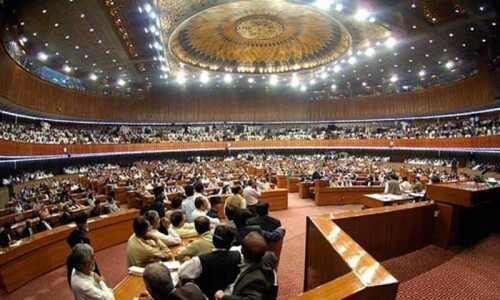ISLAMABAD: Seized with complex political, economic, judicial and constitutional challenges, the 15th National Assembly of Pakistan showcased a notable resilience to withstand the pressures on its existence and supremacy before completing its tenure on Aug 9, 2023, wielding legislative productivity that surpassed its three predecessors, said Free and Fair Election Network (Fafen) in a report released on Sunday.
The report said that despite 11 per cent fewer sittings, the legislative output of outgoing Assembly grew by 57 per cent to a total of 322 pieces of legislation as compared to the 14th National Assembly, which had passed 205 bills. The 13th Assembly had passed 134 bills and 12th Assembly only 51 bills during their respective terms.
The higher number of bills passed by the 15th National Assembly aside, the fact remains that most of these laws were bulldozed through the house and on some occasions the members even complained that the drafts were not shared with them.
The generous approval of the private members’ bills also remained a hallmark of the outgoing assembly, exhibiting collaborative spirit that steered the coalition government. More than 30pc of the approved legislation (99 bills) was initiated by private members and the remaining by the government.
Report says house passed 57pc more laws than previous assembly; most laws bulldozed through NA
It said that the legislative productivity was not the sole distinction of the 15th Assembly that also saw the first-ever successful vote of no confidence against a prime minister, resulting in the change of government.
Previously, two prime ministers faced voting on resolutions of no-confidence against them including Benazir Bhutto in 1989 and Shaukat Aziz in 2006. Both were able to retain their majority in the assembly.
The outgoing assembly was the first since 1977, to be dissolved voluntarily by the Leader of the House (Prime Minister) before the completion of its term. Except for 1993 when the assembly was dissolved under an arrangement with the establishment that saw both the president and prime minister resigning, all other preterm dissolutions were compelled by the presidential use of infamous Article 58 (2)(b).
A government-wise disaggregation of the approved bills showed the bulk of legislation (54pc) was made during the 16-month tenure of PML-N-led coalition government while PTI government oversaw the rest 46pc of the legislation in its three-and-half-year of rule. Nearly one-third of the government legislation approved by the House during PTI government’s tenure originated as presidential ordinances.
According to the report the assembly recorded 1,310 hours and 47 minutes of on-floor proceedings during its 52 sessions comprising 442 sittings in 687 working days. The assembly proceedings, however, remained suspended for 122 hours 11 minutes due to various reasons such as lack of quorum, prayer breaks, etc.
Approximately two-thirds of the assembly sittings (equivalent to 67pc) and working hours (amounting to 63pc) were completed during the PTI government’s tenure, which ended on April 9, 2022. The remaining one-third of the sittings, along with 37pc of the total working hours, were conducted during the tenure of the PML-N-led coalition government.
Asad Qaiser presided over 40pc of the proceedings himself during his term as the NA Speaker. Deputy Speaker Qasim Suri chaired nearly 39pc of the proceedings while members of the Panel of Chairpersons presided over the rest of 21pc proceedings. On the other hand, the Speaker Raja Pervez Ashraf chaired 53pc proceedings himself.
Published in Dawn, August 14th, 2023














































Dear visitor, the comments section is undergoing an overhaul and will return soon.